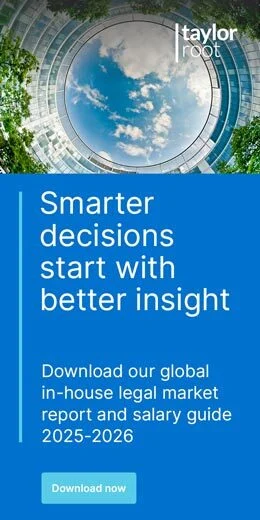The business benefits of a fractional General Counsel: Interview with Maria O’Connor
As part of our fractional General Counsel interview series, we spoke to Maria O’Connor – Experienced, personable leader and advisor and a Co-Founder of Fund-HQ, an outsourced advisory and resource platform for alternative asset managers and family offices.

How you would describe what a fractional General Counsel (GC) is?
A fractional General Counsel is a senior partner to your business. In my world, (hedge funds/private equity, venture capital and family offices) that means typically partnering and advising the most senior portfolio managers (CIO), working with the operational teams (the COO) and then advising and helping steer sales and strategy (CEO). All of this of course is within a risk, regulatory and compliance framework so it will also (depending on the size of the business) include either working closely with the individuals who manage those areas or in some cases, taking on elements of those roles also.
What does a fractional General Counsel do?
This depends hugely on the size of the business and breadth of the role needed. The big difference with a fractional GC versus a temporary or contract lawyer is that a fractional General Counsel assumes the risk and responsibility within the business. This ‘fractional’ piece could be split in many ways. It could be fractional (in time), fractional in area of responsibility (e.g. taking on all legal risk but not operational risk) or fractional in a project nature (e.g. helping through a large project such as a sales process/IPO/ fund launch etc). The difference is though that a fractional GC will- within that ‘fraction’- take on the full breadth of that responsibility and as above, partner to the business, rather than advise solely on a particular piece of advice or legal question.
What kind of companies are likely to need fractional General Counsel services?
The ideal client is an early-stage business, where the executives and managers are tired of having to manage legal matters alongside their day job. These professionals are not going to be highly experienced at engaging and understanding legal services and need someone to help streamline and make sense of their contracts, policies, compliance, employee incentives, real estate, KYC obligations and anything else vaguely “legal”. They may have had a few rounds of financing, but they are pre-revenue and therefore are not ready to invest in a full-time in-house lawyer. The fundraising rounds have opened corporate complexity, leading to more legal obligations on the company and the board. The management team may need a “grown-up in the room” as a senior trusted adviser, but they may not be able to justify the full-time headcount at that stage. If the company continues to grow, the FGC may turn into a full-time in-house legal role. A huge benefit of the FGC will be to help them recruit for this role, or indeed, occupy this role themselves.
With a fractional GC- you get the lawyer ‘plus’. I think of myself as a partner to and with the executive team. Advising and managing risk within the business
Fund HQ (the business I co-founded in 2018) provides this for outsource COOs which is a well-trodden/ understood path. We are trying to help businesses understand the huge value add an outsourced General Counsel or advisor can also provide. The key is being embedded in the business and a key partner to the senior decision makers rather than giving finite advice.
What is the value add and benefits of engaging a fractional General Counsel for businesses?
Having a senior, experienced partner who can steer the business at different stages of the life cycle (yet be embedded within) is of huge benefit. Funds (particularly scale up) will not usually need a full-time employee model. The ability to utilise a partner when required and less so when not is very valuable and efficient (both from a time and cost perspective). There are often resource intensive times particularly through a fund life cycle (or manager life cycle) where being able to scale up/down the required resource allows the business to stay lean, grow and yet benefit from senior expertise without the higher cost of external law firms.
Having a fractional General Counsel also is very useful to manage external legal and other external advisor spend (reduce or manage external costs). This is done in many ways but largely it allows the GC to ‘speak the same language’ as an external advisor and ask them the correct questions. Thereby getting targeted and therefore, ultimately, cheaper advice; managing and using the right experts where and when needed.
In the funds world, using a fractional GC from this sector means they have seen across the market and understand other clients/counterparties and the investor mind set. We know what ‘best practice’ is and how to implement it. There is a lot of synergy with the outsourced COO model (which obviously we are huge champions of at Fund HQ) and outsourcing generally.
Investors (particularly) in the fund’s world are increasingly appreciating this benefit of having senior experts and advisors either on an outsourced and/or fractional basis. Allowing the revenue generators of the business to focus on that and then to bring in and use fractional resource as partners.
I love working in this way. For me, having a great mix of clients, plus autonomy and really adding value to my client’s business is most important. Advising and partnering with the senior teams, helping them manage risk and building and scaling their business is what it’s all about.
If you are interested in a fractional role or are looking to hire a fractional position, please get in touch with Penny Parker to find out more.
Next chapter: Why senior Lawyers are embracing junior interim roles
Previous chapter: Fractional GC interview: Stephanie Dominy
INTERIM GUIDE
- Introduction
- How to determine your market rate
- Day rate vs FTC
- Understanding payment models
- Stand out on LinkedIn
- Navigating employment gaps
- Interim interview questions
- What is a Fractional GC?
- Fractional GC interview: Stephanie Dominy
- Fractional GC interview: Maria O’Connor
- Why senior Lawyers are embracing junior interim roles





